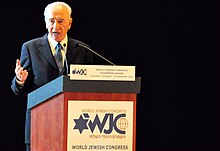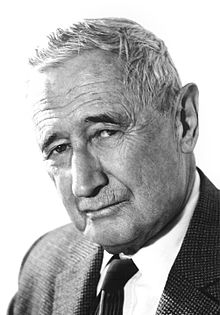World Jewish Congress
The World Jewish Congress ( Hebrew הקונגרס היהודי העולמי; English World Jewish Congress , WJC ) is an international association of Jewish communities and organizations. The WJC's claim is to represent the political interests of all Jews in the Diaspora , i.e. those who are outside the State of IsraelLife. Members of the WJC are the representative umbrella organizations of the Jewish communities in the respective countries as well as international Jewish organizations. The World Jewish Congress tries to build consensus between different Jewish groups of different political and religious orientations. The World Jewish Congress is also involved in interreligious discussions with Christian and Muslim groups.
organization
The headquarters are in New York City . The WJC also has offices in Brussels, Paris, Moscow, Buenos Aires and Geneva. On June 10, 2007, Ronald Lauder was elected to succeed Edgar M. Bronfmans as President of the WJC.

Jewish umbrella organizations in 103 countries are affiliated to the World Jewish Congress, including the Central Council of Jews in Germany , the Swiss Association of Israelite Communities and the Federal Association of Jewish Religious Communities in Austria.
The WJC has five regional subdivisions, some of which work autonomously: the Eurasian Jewish Congress, the European Jewish Congress , the Latin American Jewish Congress, the WJC-Israel and the WJC-North America.
Despite its name, the World Congress is a permanent organization. Its highest decision-making body is the plenary assembly, which takes place every four years, which elects the board of directors (executive committee) and determines the guidelines for the work of the association. All member associations send delegates to plenary assemblies according to the number of Jews living in the respective country. In January 2009 over 400 representatives from 62 countries gathered for the 13th WJC General Assembly in Jerusalem.
In 2013 the 14th WJC General Assembly took place from May 5th to 7th. Budapest was chosen as the conference venue in order to set an example against the growing anti-Semitism in Hungary.
The World Jewish Congress held its 15th General Assembly in New York from April 23-25, 2017. It was the first time in its 80-year history that the WJC's top governing body held its four-year plenary session in the United States.
The World Jewish Congress hosted the first international meeting of Special Envoys and Coordinators Combating Antisemitism (SECCA) in the Romanian capital Bucharest from June 17-18, 2019 , in which 32 representatives met Working specifically for the protection of Jewish communities to join more than 50 of the best professionals in the Jewish world to discuss best practices. The meeting was organized under the auspices and with the participation of the Romanian Presidency of the Council of the European Union in collaboration with the WJC. It coincided with the WJC's 6th National Community Directors Forum, an annual gathering of more than 50 key representatives from WJC member communities to discuss the key issues facing Jewish communities today. The focus was in particular on the global increase in anti-Semitism.
story
Foundation and goals

The WJC was founded on August 13, 1936 in Geneva, among others. founded by Nahum Goldmann , who later chaired him as president, and representatives from 32 nations. The model for the WJC was the American Jewish Congress , which was founded in 1918 , which was intended to represent a broadly legitimized and active counterweight to the existing upper-class Jewish organizations in the formation of political opinions. Another predecessor was the 1919 against the backdrop of the Paris Peace Conference resulting Comité des Délégations Juives . Stephen Wise became the first president of the organization .
The WJC has also been a Zionist organization since its inception . Nahum Goldmann considered the creation of a separate state of Israel to be premature after the First World War , but from the late 1920s onwards he became increasingly committed to it.
time of the nationalsocialism
Since the seizure of power of the Nazis in 1933, the WJC tried increasingly to provide assistance to emigrate European Jews. Initially, however, his political successes were limited. Although the WJC achieved a right to emigrate for Jews from Saarland , which was annexed to the German Reich in 1935 , it was unable to persuade the League of Nations to undertake a joint economic boycott against the “Third Reich”. Not even all of the WJC members endorsed this plan.
Ignacy Schwarzbart , who was both a Jewish member of the Polish National Assembly - the parliament of the government in exile - and the representative of the WJC in England, responsible for Polish-Jewish affairs, became known from the time of National Socialism .
post war period
After the Second World War and under the impact of the Holocaust , the WJC stepped up its political interventions to help endangered Jews around the world, at that time primarily in the Eastern Bloc and Arab countries, and to enable them to emigrate to Israel from 1949 onwards . In addition to organizations such as the Jewish Claims Conference , he always advocated reparations for the survivors and descendants of the Jews persecuted during the Nazi era.
In the Middle East , WJC President Nahum Goldman was committed to a policy of compromise between Israel and its Arab neighbors until his death and sought talks with Gamal Abdel Nasser and Yasser Arafat . While he always supported the immigration of Jews from the region to Israel, he was at times a profound critic of official Israeli politics.
The "Waldheim Affair"
The "Waldheim Affair" made the WJC known to a wider public. The former UN Secretary General Kurt Waldheim ran for the office of Federal President of Austria in 1986 . His membership in the SA cavalry corps, the NSDStB and his work as an orderly officer in Army Group E , which was involved in various war crimes in the Balkans and deportations of Greek Jews from 1942 to 1945, became known during the election campaign . Autobiographical publications had contained nothing about this phase of life.
The WJC became Waldheim's main prosecutor from mid-March 1986 and, until his election as Federal President, repeatedly submitted documents alleging its involvement in Nazi crimes. The WJC successfully applied for the US Department of Justice to put Waldheim on a " watch list " for alleged war criminals, so that as a private person he was banned from entering the USA for his entire life. On the part of people close to Waldheim this was described as a " smear campaign " against Austria. In this context, anti-Semitic prejudice structures were also openly visible or revived. The WJC was subsumed by right-wing extremist circles together with the US media under the metaphor of the " East Coast ", a code of these circles for " World Jewry ". In the course of the election campaign, the slogan "Now more than ever" was posted and Waldheim was elected Federal President. As a result of the affair, historians intensified research into the history of Austria during the National Socialist era , and Austria's people's parties took on responsibility - albeit much later - (apology from Chancellor Vranitzki, victim compensation and restitution under Chancellor Schüssel).
The Austrian federal government set up an international commission of historians, which Waldheim could not prove any war crimes, but came to the conclusion that he must have had detailed knowledge of them in his position and had concealed parts of his military activities or provided false information about them in the public discussion . Waldheim further denied having known about war crimes committed by his army unit before 1945, and during his six-year term as Federal President (until 1992) remained largely isolated in terms of foreign policy.
Criticism of the European Commission
In December 2003, the WJC caused a sensation across Europe by commissioning a report on anti-Semitism in Europe from the Berlin Center for Research on Antisemitism from the European Monitoring Center on Racism and Xenophobia (EUMC) , which has not been published since it was received in January made accessible. The EUMC took the position that the report had qualitative deficiencies (which the Berlin center rejected) and had to be revised before publication. The WJC, on the other hand, criticized the fact that although this report was withheld because it covered the involvement of Muslim minorities in anti-Semitic incidents in Europe and could thus fuel Islamophobia , the European Commission had recently published an opinion poll in which 59% of the respondents Identified Israel as the greatest threat to world peace. In this context, the two presidents of the WJC, Edgar Bronfman sen. and Cobi Benatoff , who accused the commission of anti-Semitism in a contribution to the Financial Times .
The conflict was finally settled after talks between representatives of the European Commission under Commission President Romano Prodi and the WJC and the European Jewish Congress (EJC). The commission promised to hold a previously canceled seminar with Jewish organizations to combat anti-Semitism.
Presidents
- Stephen Wise (1936-1949)
- Nahum Goldmann (1949–1977)
- Philip M. Klutznick (1977–1979)
- Edgar M. Bronfman (1979-2007)
- Ronald S. Lauder (since 2007)
Anti-Semitism Commissioner for the World Jewish Congress
Julius Meinl V. was appointed Commissioner for Anti-Semitism at the World Jewish Congress for Combating Anti-Semitism in October 2017 .
Other Jewish interest groups
- American Israel Public Affairs Committee (AIPAC)
- American Jewish Committee
- American Jewish Congress
- Anti-Defamation League (ADL)
- B'nai B'rith
- Conference of Presidents of Major American Jewish Organizations
- Jewish Claims Conference
See also
Theodor Herzl Prize
This award is presented annually by the WJC to men and women to recognize their extraordinary efforts on behalf of Israel and the Zionist cause. The prize was first awarded in 2004 on the occasion of the 100th anniversary of Theodor Herzl's death .
Prize winners include:
2014: Axel Springer , posthumously
2019: Angela Merkel , Nikki Haley
literature
- Emmanuel Deonna: World Jewish Congress. In: Dan Diner (Ed.): Encyclopedia of Jewish History and Culture (EJGK). Volume 3: He-Lu. Metzler, Stuttgart / Weimar 2012, ISBN 978-3-476-02503-6 , pp. 263-268.
Web links
- Official website
- Cologne: living together. The Jewish National Fund presented environmental and social projects, Jüdische Allgemeine, September 15, 2016: http://www.juedische-allgemeine.de/article/view/id/26499
Individual evidence
- ↑ World Jewish Congress. Ronald S. Lauder remains president. In: juedische-allgemeine.de May 26, 2021.
- ^ World Jewish Congress - About Us
- ^ World Jewish Congress Plenary Assembly kicks off this Sunday in Budapest at worldjewishcongress.org, May 3, 2013 (accessed May 5, 2013).
- ↑ Baumann, Meret: Hungary: A Sign Against Growing Anti-Semitism at nzz.ch, May 2, 2013 (accessed May 5, 2013).
- ↑ http://www.worldjewishcongress.org/en/events/480
- ^ 15th WJC Plenary Assembly . Retrieved October 16, 2019.
- ^ 6th WJC National Community Directors' Forum, Bucharest . Retrieved October 16, 2019.
- ^ Combatting Antisemitism Unit , World Jewish Congress. Retrieved October 16, 2019.
- ↑ Nikki Haley awarded the Herzl Prize. Israelnetz.de , November 8, 2019, accessed on November 10, 2019 .

